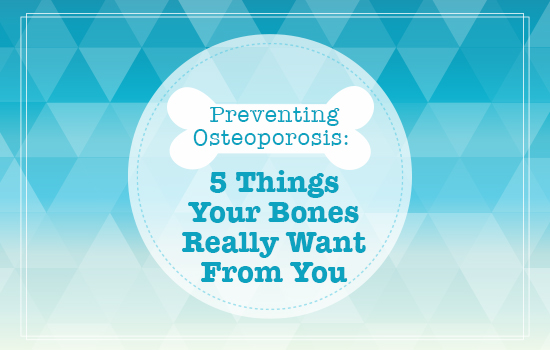Osteoporosis is a debilitating disease that effects up to 54 million Americans. New evidence suggests that not only is osteoporosis largely preventable, it’s also not a normal part of aging. It’s time to let your body grow and age as it was meant to by giving your bones what they ask for. And the best news is, they don’t ask for much. Just these five things.
Calcium
Ask people how to prevent osteoporosis and, chances are, they’ll know that calcium is a huge part of it. What they may not know is why. Common knowledge is that calcium builds strong bones; reality is that calcium keeps bones strong.
Think of your bones and teeth as the human body’s savings account for calcium and other important minerals. Every day your body uses calcium to pay for certain crucial functions, like blood clotting, muscle contracting, and nerve messaging. It would much rather use the calcium in its wallet—that is, calcium freely available from foods you eat every day. However, if there isn’t enough calcium cash flow, then it must take it where it can, which is in its skeleton savings account. The longer it does this, the more depleted your savings account gets, and the weaker your bones become.
Your job, from childhood to your later years, is to keep an abundant calcium cash flow. Eat enough dairy, dark green leafy vegetables, salmon, and nuts (and a supplement or two, if needed) to fund your daily activities, and a bit more to sock away into your skeleton reserves. Do it every day, and you’ll have a strong body well into retirement.
Vitamin D
Children need Vitamin D to build strong bones; adults need vitamin D to keep them strong and healthy. Calcium and Vitamin D need each other to work properly, which is why they are often supplemented together, and why we list them together in this blog.
There are three ways for your body to get the Vitamin D it needs: food, sunlight, and supplements. A simple blood test can tell you if your body is getting enough Vitamin D to function properly; so can a Vitamin D deficiency symptom assessment. Given the average American diet and the amount of time we now spend in our climate-controlled indoors, however, chances are that you are running a little low.
The best way to give your bones the Vitamin D they need is to get 15 minutes of sunshine, eat food naturally high in vitamin D, like egg yolks and salmon, as well as fortified food, and take a supplement.
Exercise
Nearly every kind of exercise will help your bones and your body stay strong, limber, and functioning properly. High impact exercises, like running, hiking, dancing, and jumping, as well as weight-training exercises like isometrics and hand weights, put pressure on your bones to keep creating newer, stronger bone tissue.
When high-impact exercises aren’t possible, do the next best thing. Walking, using low-impact exercise equipment (think elliptical trainers and stair-steppers), and low-impact aerobics all keep bones strong; you just have to do them more often or for a bit longer.
Exercise has so many profound benefits, and strengthening bone tissue is one of the most important. Make a point to challenge your body every day, whether it’s with flexibility, endurance, muscle training, or bone-building. Make fitness a daily priority and your body will walk away stronger well into your 90s.
Clean living.
Processed foods, alcohol, and smoking rob the body of the health it needs. It takes energy and natural resources from your body to break down, process, and eliminate foreign and dangerous products from the body, and sometimes—if not all the time—this wear and tear comes at a high price.
Heavy alcohol consumption (more than 1-2 drinks a day) can lead to bone loss. Caffeine in coffee, tea, and soft drinks can negatively affect calcium absorption, which works against any good eating habits you are trying to form. While smoking may not be directly linked to poor bone density, smokers typically have higher risk factors for osteoporosis, including poor fitness, nutrition, and alcohol habits.
Give your body (and your bones) the best chance at staying healthy by feeding it food it can easily break down, process, and use, and try not to get in its way with alcohol, cigarettes, and caffeine.
A good doctor.
Sometimes we get started a little late. Sometimes we do everything we can and we still come up short. Sometimes our bones could just use some really good advice. This is why your bones need you to have a good doctor on your team. A doctor will tell you how to apply the four elements above in a way that is safe and healthy for your body. A doctor will help assess your bone density, answer your questions, address your concerns, and give you guidance on supplements, dietary needs, lifestyle changes, and support systems.
Want to learn more about osteoporosis and how to prevent it? Check out the National Osteoporosis Foundation and its “Break Free” campaign. Even better, come in for a physical and talk with one of our doctors about your risk factors, and schedule your DEXA-Scan, which can help assess your risk. And remember, it’s never too late, or too early, to build strong bones.


